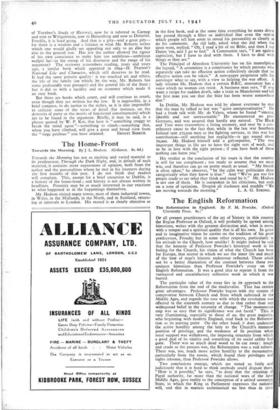The Home-Front
Towards the Morning. By J. L. Hodson. (Gollancz. 8s. 6d.) Towards the Morning has not as exciting and varied material as its predecessor, Through the Dark Night, and, in default of such material, it contains more expressions of opinion, both from the author and the personalities whom he met in his journeys during the first months of this year. I do not think that readers will complain. This, except for a brief excursion to Dublin, is a history of the home-front ; and history is not always written in headlines. Posterity may be as much interested in our reactions to what happened as in the happenings themselves.
Mr. Hodson visited many towns, most of them industrial towns, in Wales, in the Midlands, in the North, and in Scotland, return- ing at intervals to London. His record is as clearly objective as in the first book, and at the same time everything he notes down has passed through a filter so individual that even the stories which people tell him seem to reveal his personality as clearly as do his comments. An old lady, asked what she did when the siren went, replied, "Oh, I read a bit of mi Bible, and then I say Damn 'em, and I go to bed." A Communist says, "I am against capitalists but I have to deal with them. I have to deal with things as ;hey are."
The Principal of Aberdeen University has on his mantelpiece the legend, "A committee is a contrivance by which persons who separately can take no effective action collectively decide that no effective action can be taken." A newspaper proprietor tells his astrologer what to say, with a view to helping the war effort. A lady informs Mr. Hodson that a certain B.B.C. announcer has a voice which no woman can resist. A business man says, "If you want a recipe for sudden death, take a train to Manchester and tell the first man you see that the blitz has been worse somewhere else."
In Dublin, Mr. Hodson was told by almost everyone he met that the man he talked to last was "quite tuirepresontative." He had a frank talk with Mr. de Valera, whom he found "sincere, likeable and not unreasonable." He encountered no pro- Germans, and was assured that hardly any existed. The Black and Tans were everywhere a living memory, and may be a con- tributory cause to the fact that, while in the last war Southern Ireland sent 270,000 men to the fighting services, in this war her contribution—still anything but negligible—is wit round about 70,000. Mr. Hodson himself told a girl-reporter, "The two important things in life are to have the right sort of work, and to be in love with the right person ; if you have both of those nothing can harm you."
His verdict at the conclusion of his tours is that the country is still far too complacent ; too ready to assume that we must win, and therefore can go on pretty much as usual. "My breath is often taken," he observes, "by the calm way politicians deny categorically what they know is true." And "We've got too few people ready to say what they think and stand by it." Mr. Hodson is not one of them. He is outspoken in his criticisms, but ends on a note of optimism. Despite all slackness and muddle "We
are moving towards the morning." L. A. G. STRONG.


























 Previous page
Previous page